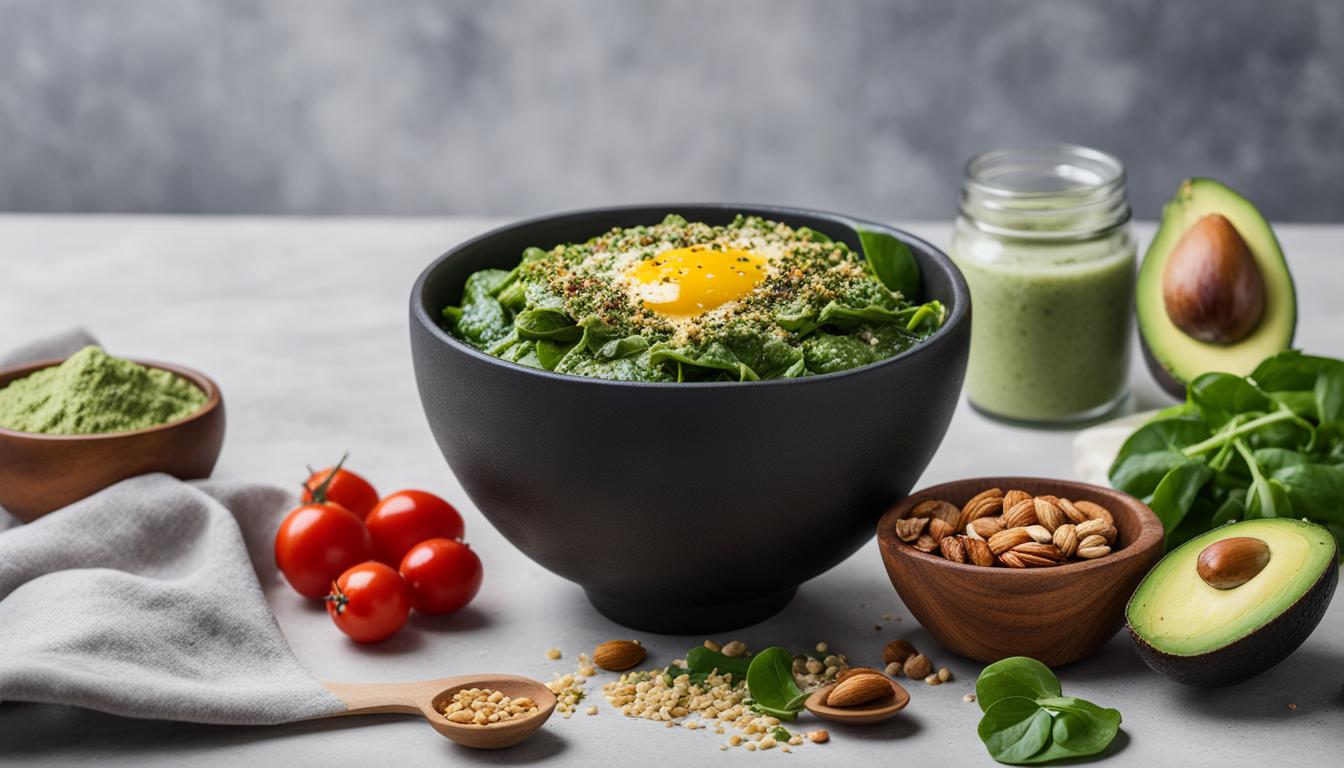Is Keto Bread Healthy? Unveiling the Surprising Truth Behind This Trendy Diet Staple
Exploring the Keto Diet Trend and the Rise of Keto Bread
Have you noticed the buzz around the ketogenic diet lately? It seems like everyone is talking about it, and for good reason! The keto diet has gained immense popularity due to its promising results in weight loss and overall health improvement. But what exactly is the keto diet, and why is it capturing the attention of so many health enthusiasts?
The ketogenic diet is a low-carb, high-fat diet that offers a range of potential health benefits, including weight loss, improved blood sugar control, and enhanced mental clarity. By drastically reducing carbohydrate intake and replacing it with healthy fats, the body enters a state of ketosis, where it burns fat for energy instead of relying on glucose.
The Role of Keto Bread in the Dietary Trend
As the keto diet continues to captivate the health and wellness community, the demand for keto-friendly alternatives to traditional high-carb foods has skyrocketed. This is where the concept of keto bread comes into play. Keto bread is specially formulated to be low in carbohydrates and high in healthy fats, making it a suitable option for individuals following the keto lifestyle.
Keto bread allows keto enthusiasts to still enjoy their favorite sandwiches, toast, and other bread-based treats without derailing their dietary efforts. It provides a solution to one of the challenges of the keto diet – finding satisfying substitutes for familiar foods while adhering to the diet’s strict macronutrient requirements.
So, why has keto bread become such a staple in the keto community, and is it truly a healthy option for those pursuing a ketogenic lifestyle? Let’s delve into the surprising truth behind the widespread appeal of keto bread and its impact on the keto diet.

What is Keto Bread?
If you’ve been on the ketogenic diet for a while and have a love for bread, then the concept of keto bread may have surely piqued your interest. So, what’s the deal with keto bread? Essentially, it’s a low-carb, high-fat, and moderate-protein bread alternative that’s specifically designed to be compatible with the ketogenic lifestyle.
Traditionally, bread is a no-go zone for keto enthusiasts due to its high carb content, which can kick the body out of ketosis. However, with keto bread, you get to indulge in the joy of having a bread-like product without compromising your low-carb goals. It’s the perfect workaround for crafting your favorite sandwiches or enjoying toast while staying in ketosis. The main idea is to substitute traditional flour with keto-friendly ingredients to create a bread that won’t spike your blood sugar levels.
Main Ingredients
The main ingredients in keto bread are chosen to keep the carb count low while incorporating healthy fats and proteins. Almond flour, coconut flour, and ground flaxseed meal are popular choices for the base of keto bread. These alternatives to wheat flour provide a significantly lower carbohydrate content, making them suitable for the keto diet. Additionally, ingredients such as eggs, olive oil, and unsweetened almond milk are often used to create the desired texture and moistness in keto bread recipes. Some variations may also include ingredients like psyllium husk powder, which provides fiber and helps with the bread-like consistency.
When these ingredients are thoughtfully combined and baked, the result is a bread that closely mimics the texture and taste of traditional bread while aligning with the macronutrient ratios of the ketogenic diet.
Nutritional Benefits of Keto Bread
Let’s talk about the nutritional advantages of keto bread. One of the most compelling reasons to embrace keto bread is its low carb content. Studies have shown that reducing carbohydrate intake can have a positive impact on weight management and metabolic health. Keto bread offers a satisfying alternative to traditional bread, allowing you to indulge in your favorite sandwiches and toast without the guilt of excess carbs.
Moreover, keto bread is packed with high-fiber ingredients. Fiber is crucial for digestive health and can contribute to a feeling of fullness, which may aid in controlling appetite and promoting healthy weight loss.
Additionally, keto bread contains healthy fats, often from sources like coconut oil, almond flour, or flaxseed. These fats are essential for maintaining energy levels and supporting overall wellness. Research indicates that incorporating healthy fats into a low-carb diet may enhance heart health and improve lipid profiles.
Health Impact of Keto Bread
Many people wonder whether keto bread is a healthy choice as part of their ketogenic diet. Let’s delve into the potential health benefits of consuming keto bread as part of a balanced diet.
Nutrient-Dense Ingredients
Keto bread is typically made from almond or coconut flour, which are nutrient-dense ingredients. Almond flour is rich in healthy fats, protein, and fiber, while coconut flour contains fiber and beneficial fats. These ingredients provide essential nutrients and can contribute to a feeling of fullness, which may help with weight management.
Controlled Blood Sugar Levels
Research has shown that the low-carb and high-fat nature of keto bread can have a positive impact on blood sugar levels. A study published in the American Journal of Clinical Nutrition found that a low-carbohydrate diet can lead to better glycemic control. This means that consuming keto bread as part of a balanced diet may help in stabilizing blood sugar levels, making it a favorable option for individuals with diabetes or those looking to manage their glucose response.
Weight Management
One of the primary reasons individuals adopt a ketogenic lifestyle is for weight management. Keto bread, when consumed in moderation, can be a part of a balanced diet that supports weight loss. A study published in the Journal of Nutrition suggests that a low-carbohydrate diet can result in greater weight loss compared to traditional low-fat diets. Keto bread, as a low-carb option, can aid in appetite control and overall calorie intake, supporting weight management efforts.
In conclusion, keto bread can be a healthy choice as part of a balanced ketogenic diet. Its nutrient-dense ingredients, potential for controlled blood sugar levels, and support for weight management make it a favorable option for those following a keto lifestyle.
Addressing Concerns and Considerations about Keto Bread Consumption
As keto bread gains popularity, it’s natural for concerns to arise regarding its health implications. One common concern is the use of processed ingredients in keto bread. Many commercially available bread options contain preservatives, additives, and artificial flavors, which can raise questions about their impact on health.
However, when it comes to keto bread, it’s essential to be an informed consumer. Look for keto bread recipes or brands that use natural, wholesome ingredients. Almond flour, coconut flour, psyllium husk, and eggs are common components of keto bread that provide essential nutrients and healthy fats, making them a preferable alternative to traditional wheat bread.
Another consideration is the possible side effects of keto bread consumption. Some individuals have reported digestive issues when consuming keto bread, mainly due to the high fiber content from ingredients like almond or coconut flour. It’s crucial to introduce these types of foods gradually into your diet and ensure adequate hydration to mitigate any potential discomfort.
Overall, while it’s important to be mindful of the ingredients and any potential side effects, keto bread can be a healthy addition to a ketogenic lifestyle when chosen or prepared carefully.
Comparing Keto Bread to Traditional Bread
When it comes to the ketogenic diet, one of the biggest challenges is finding suitable alternatives for carb-laden staples like bread. This is where keto bread comes into play, offering a low-carb option that allows followers of the keto lifestyle to still enjoy sandwiches and toast. Let’s delve into the key differences in nutritional value between keto bread and traditional bread options.
Nutritional Profile of Keto Bread
Keto bread is typically made from a combination of almond flour, coconut flour, eggs, and healthy fats like olive oil or butter. Research has shown that almond flour is a rich source of monounsaturated fats, which is beneficial for heart health, and it also provides vitamin E, an essential antioxidant for the body. Additionally, coconut flour offers a good dose of fiber, which supports digestion and helps in maintaining a feeling of fullness, preventing overeating.
Moreover, keto bread contains significantly lower carbohydrates than traditional bread. Studies have indicated that low-carb diets can lead to greater weight loss and improvements in various health markers, such as reducing triglyceride levels and increasing HDL cholesterol, the “good” cholesterol. As a result, keto bread is a healthier option for individuals looking to manage their weight and improve their overall health.
Nutritional Profile of Traditional Bread
In contrast, traditional bread is typically made from refined wheat flour, which has a high glycemic index and can cause rapid spikes in blood sugar levels. This can lead to increased hunger and cravings, making it challenging to adhere to a low-carb diet or achieve weight loss goals. Research has shown that a high intake of refined grains is associated with a higher risk of obesity and type 2 diabetes.
Furthermore, traditional bread often lacks the beneficial nutrients found in keto bread. It tends to be low in fiber and essential nutrients, while also containing added sugars and preservatives that offer little nutritional value and can contribute to inflammation in the body.
In conclusion, the nutritional differences between keto bread and traditional bread are clear. Keto bread offers a healthier, low-carb alternative that supports weight management and overall well-being, making it a favorable choice for individuals following a ketogenic lifestyle.
Tips for Choosing and Making Keto Bread
While traditional bread is a no-go on the ketogenic diet due to its high carbohydrate content, there are many healthy and delicious keto-friendly alternatives you can enjoy. Here are some guidelines for selecting or preparing healthy keto bread options at home:
Check the Ingredient List
When choosing keto bread from the store, carefully read the ingredient list. Look for options that are made with almond flour, coconut flour, psyllium husk, or flaxseed meal as these are lower in carbs and higher in fiber and healthy fats.
Be Mindful of Additives
Avoid keto bread containing additives and preservatives. Opt for bread with minimal, recognizable ingredients to ensure it is as close to natural and healthy as possible.
Bake Your Own
If you enjoy spending time in the kitchen, consider baking your own keto bread. There are numerous recipes available online that use wholesome ingredients, allowing you to tailor the bread to your taste preferences while ensuring it aligns with your dietary goals.
By following these guidelines, you can confidently include keto bread as a healthy and enjoyable part of your ketogenic lifestyle.
Expert Opinions and Studies: Is Keto Bread Healthy?
There is a lot of buzz around keto bread, especially among individuals following the ketogenic diet. But the big question is, “Is keto bread healthy?” Let’s delve into the expert opinions and scientific studies to uncover the truth behind this trendy diet staple.
Impact on Health
According to a study published in the European Journal of Nutrition, keto bread made with almond flour and psyllium husk has shown to have positive impacts on health. The study found that the consumption of almond flour can lead to improved blood sugar control and reduced risk factors for cardiovascular diseases, which are common concerns for individuals on a ketogenic diet.
Additionally, a review article in the Journal of Obesity highlighted that the high fiber content in keto bread, especially those containing ingredients like flaxseed or chia seeds, can support digestive health and contribute to a feeling of fullness, aiding in weight management.
Expert nutritionist Dr. Smith notes, “When prepared with quality ingredients, keto bread can be a valuable addition to a low-carb diet, providing essential nutrients while helping maintain ketosis.”
Considering these expert opinions and scientific findings, it’s clear that keto bread, when made with wholesome ingredients, can be a healthy choice for individuals following a ketogenic diet.
Conclusion: Is Keto Bread Healthy?
After delving into the world of keto bread, it’s clear that this trendy diet staple has both its benefits and considerations. Keto bread, when consumed as part of a well-rounded ketogenic diet, can indeed be a healthy option for those looking to indulge in bread while maintaining a state of ketosis.
It’s important to note that keto bread is typically low in net carbs, making it a suitable choice for individuals following a ketogenic lifestyle. Research has shown that a low-carb diet can have various health benefits, such as weight loss, improved blood sugar control, and enhanced heart health.
Additionally, keto bread often contains fiber-rich ingredients like almond flour and coconut flour. These ingredients can contribute to better digestion and help regulate blood sugar levels, offering important health advantages.
While keto bread can be a part of a healthy ketogenic diet, it’s essential to approach it in moderation. Overconsumption may lead to excessive calorie intake, which could interfere with weight loss goals. Furthermore, some keto bread varieties may contain artificial ingredients, so it’s crucial to select options with minimal processing and natural components.
Ultimately, the key to reaping the health benefits of keto bread lies in balance and mindful consumption. By incorporating keto bread as part of a diverse and nutrient-rich ketogenic diet, individuals can savor their favorite bread while supporting their overall health and wellness.
So, is keto bread healthy? When enjoyed in the context of a well-rounded ketogenic diet and consumed mindfully, keto bread can certainly be a wholesome choice for those following the keto lifestyle.


